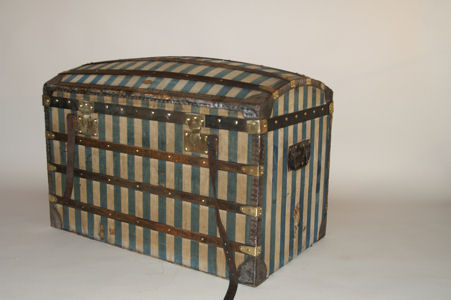Vuitton, the evolution of motifs!
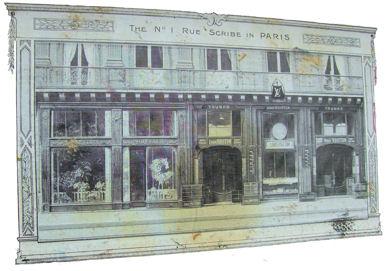
This post is about Vuitton history; if you are looking for information on trunk value, please read the blog postg ( How much for my Vuitton ? )
- 1858 - 1873 : light gray canvas called gray Trianon (gray was considered a very innovative color because all trunks in that time were rather dark!)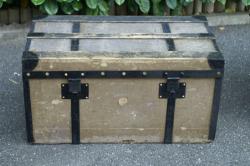
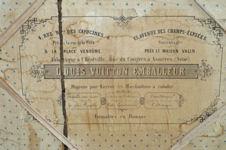
- 1872 : beige and red striped canvas

- 1876 : dark beige and light beige striped canvas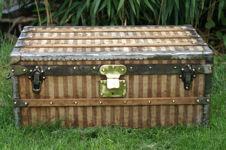
- 1888 : : brown and beige checked canvas called “damier” canvas (moleskin technique) 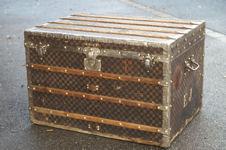
- 1896 : arrival of the famous monogram. 4-petal flowers in a beige circle; diamond spikes with a star; stars with a central dot + LV initials on a brown background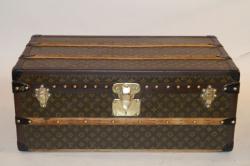
Summary video
Examples of Vuitton-made trunks
See examples of Louis Vuitton on sales: LV trunks : LV trunks on the website www.la-malle-en-coin.comFor a valuation, please read the post on the blog : " How much for my Vuitton in the shop-window "
There are hundreds of different trunks ...
We present below, the standard range, then the special trunks of Louis Vuitton.
Important: all trunks presented in photos below are trunks that we have restored in OUR workshops.
We only publish our work.
The Steamer Trunk
The steamer trunk is available in gray, striped brown or red, yellow or dark checkered
Monogram woven, stencilled or printed, in natural leather and in the colors Vuittonite
The steamer trunk "classic" exists from 70 to 110 cm
Nowadays, in new, Vuitton still offers them from 90 cm to 110 cm.
It exists in a man version (height about 50 cm) and in a woman version (about 65 cm)
Their finishes vary between steel angles, lozin or leather;
Article sur l'histoire des malles courrier vuitton
|
|
|
Leather steamer trunk
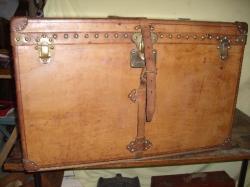
The steamer trunk comes in a range of striped canvas, damier canvas, monogram canvas and Vuittonite.
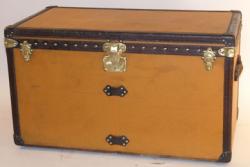
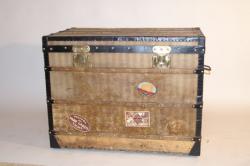
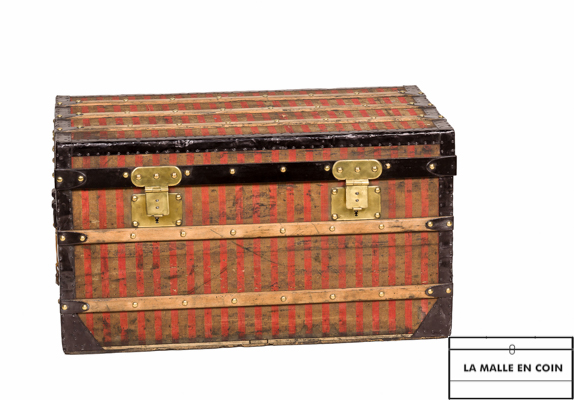 Red Stripped LV steamer trunk
Red Stripped LV steamer trunk
Louis Vuitton Cabin Trunk
The trunk cabin is a trunk 33cm high,
historically geared to be slipped under the beds of the liner cabins,
Originally, they are lower than steamer trunks.
They also exist in all lengths and types of canvas.
Their finish varies from steel angles, lozins or leather;
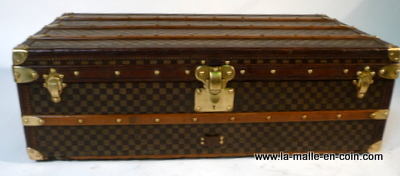 Louis Vuitton Damier cabin trunk Louis Vuitton Damier cabin trunk |
|
Louis Vuitton's Wardrobe Trunk
The trunks are very different
They exist in 55 cm of depth and in 65 cm.
In height, they are from 110 cm to 145 cm, for larger ones.
They have facilities that differ according to the models and the needs of the client.
The trunk trunk is transported horizontally for this model and is used vertically.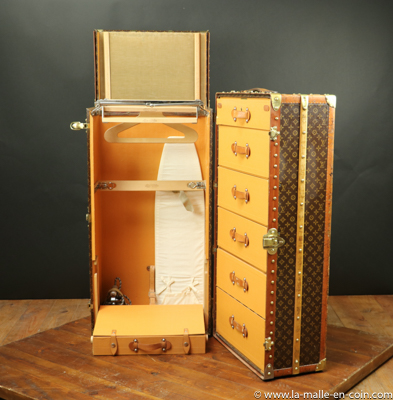 Trunk trunk 65 cm monogram Trunk trunk 65 cm monogram |
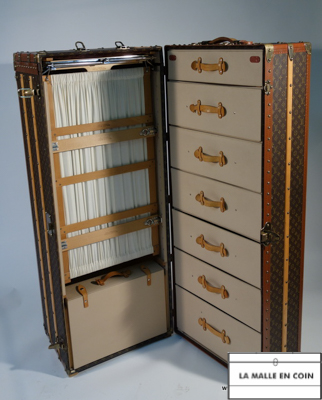 Wardrobe 145 cm Louis Vuitton printed monogram 1980 Wardrobe 145 cm Louis Vuitton printed monogram 1980 |
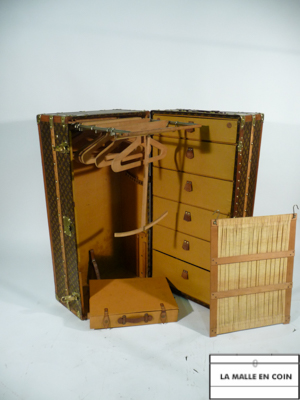 Wardrobe Louis Vuitton 55cm Monogram Stencil Wardrobe Louis Vuitton 55cm Monogram Stencil |
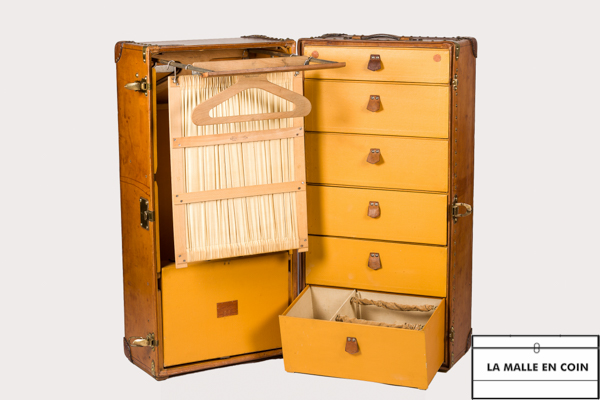 Louis Vuitton leather wardrobe trunk Louis Vuitton leather wardrobe trunk |
Hat trunk
It exists for women or men and can store 1 to 12 hats, for the largest.
They are either of cubic form of small dimension (man),
65X65X65 format for women,
either of steamer format, with a hat chassis.
example of Vuitton hat trunk and video on a brief history of hat trunks
Article on Louis Vuitton's Hat Trunks.
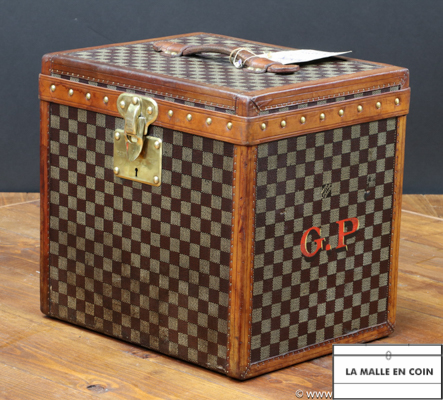 Checker hat trunk for man 35 cm Checker hat trunk for man 35 cm |
|
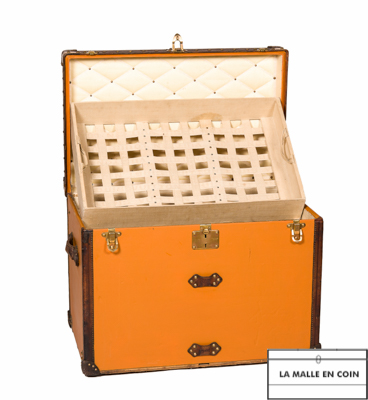 Vuittonitte orange women's hat trunk
Vuittonitte orange women's hat trunk
Shoe trunk
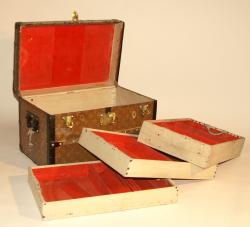
Ce type de malle permet de ranger plusieurs paires de chaussures, espacées et protégées des chocs par des séparateurs en
suédine comme l'intérieur des chassis.
La Lily Pons, du nom de la cantatrice qui a commandé la première malle de ce modèle, est une malle 30 paires.
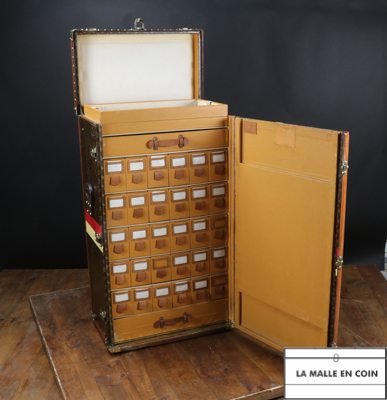 LV Lily Pons Trunk, stencil monogram canvas, 30 pairs of shoes
LV Lily Pons Trunk, stencil monogram canvas, 30 pairs of shoesCommod trunk
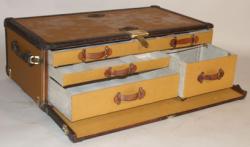
Equipped with several adapted drawers, the commode trunk enables an easy access to one’s clothes. It exists in multiple models which differ in height.
Trunk for shirts
Library trunk
The library trunk is small because of the weight of the books.
It is made as standard in monogram and on order in natural leather.
The leather trunk, pictured below, has been restored for the luggage museum
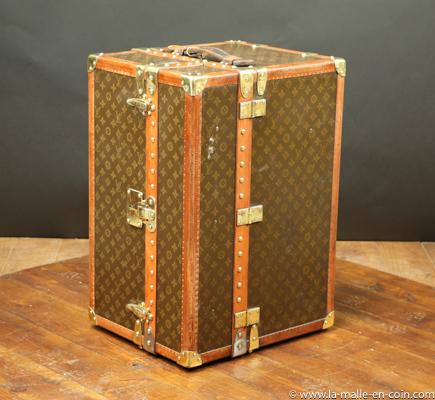 Monogram library trunk Monogram library trunk |
|
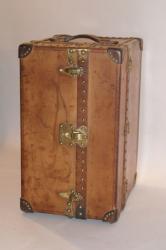 Leather library trunk Leather library trunk |
|
Automotive trunk
They are numerous and of different forms. They are available in varnished mahogany wood, in black, red or monogrammed canvas.
Concave trunks for vehicles from the 1910s to more contemporary suitcases, including those with a square shape, for the yellow cruise.
 Car trunk with integrated suitcases, Louis Vuitton black coated canvas
Car trunk with integrated suitcases, Louis Vuitton black coated canvas
Automotive trunk for tools
 Tooled monogram trunk
Tooled monogram trunk
Hemingway Trunk
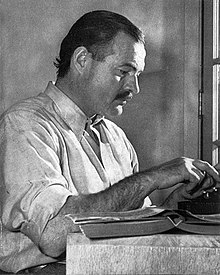
Originally made for the writer Ernest Hemingway, the model has adopted its name
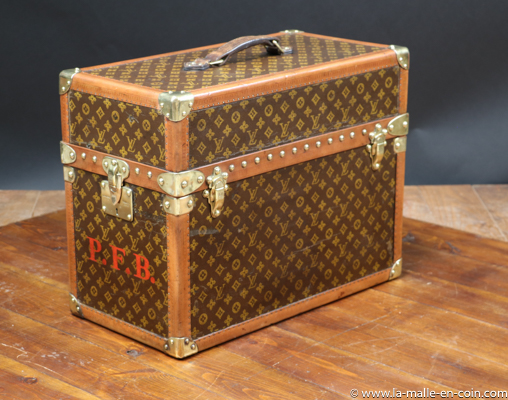 Hemingway secretary trunk Louis Vuitton canvas stencil 60 cm Hemingway secretary trunk Louis Vuitton canvas stencil 60 cm |
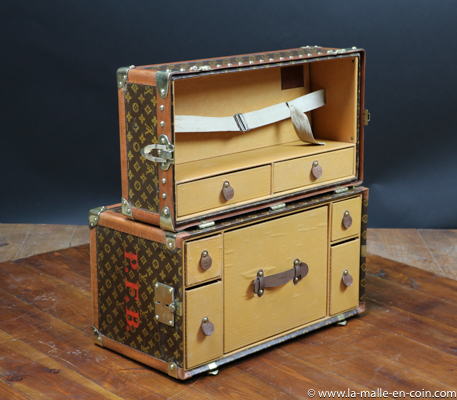 Hemingway secretary trunk Louis Vuitton canvas stencil 60 cm Hemingway secretary trunk Louis Vuitton canvas stencil 60 cm |
Article on Hemingway trunks
Picnic trunk
This picnic trunk is a typical example of a special order made at the request of a customer.
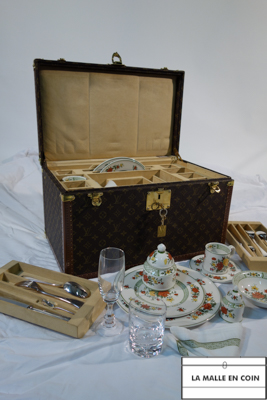 |
|
Stokowski Trunk
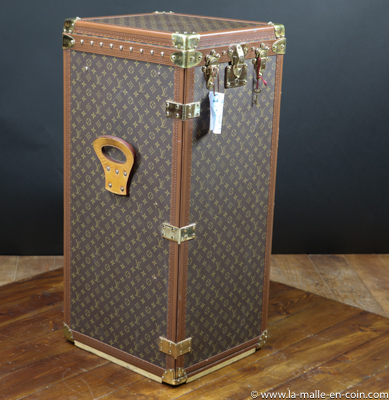 |
|
In 1929, Leopold Stokowski asked Georges Vuitton to build a trunk for his travels, like Conan Doyle.
a trunk exclusively imagined for him and to respond to his work habits while traveling.
See articles on the Stokowski trunk
Albert Kahn Trunk
The trunks created especially for Albert Kahn, with the motif of 3 white birds.
Albert Kahn, born Abraham Kahn in Marmoutier in Alsace on March 3, 1860 and died in Boulogne-Billancourt on November 14, 1940, is a French banker and philanthropist. He has collected an important iconographic collection entitled Archives of the Planet, a collection of autochromes (color photographs on glass plates) the largest in the world, and black and white films, fonds preserved at the departmental Albert-Kahn museum.
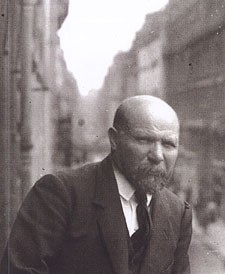
Wikipedia https://en.wikipedia.org/wiki/Albert_Kahn_
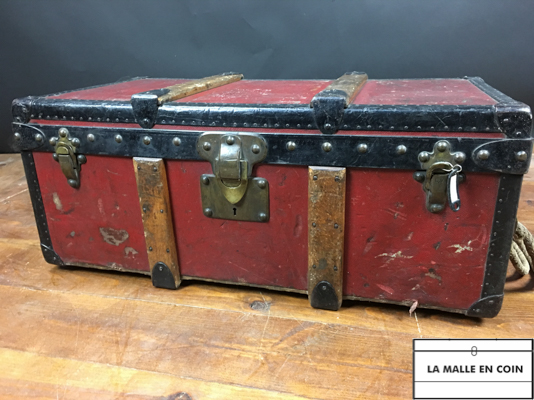 |
|
Britannica encyclopedia trunk
Longitudinal trunk, destined to rank the complete encyclopedia.
Particularly, this trunk has 2 locks, but has no hinge.
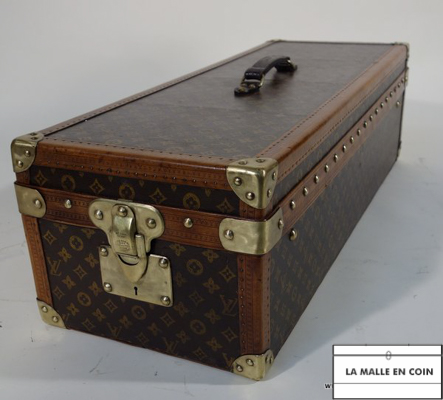
Flower trunk
Created in the 1910s, for their best customers, the Fleur Malle is a romantic model that finds its roots in the long tradition of Louis Vuitton.
It was offered to pregnant clients.
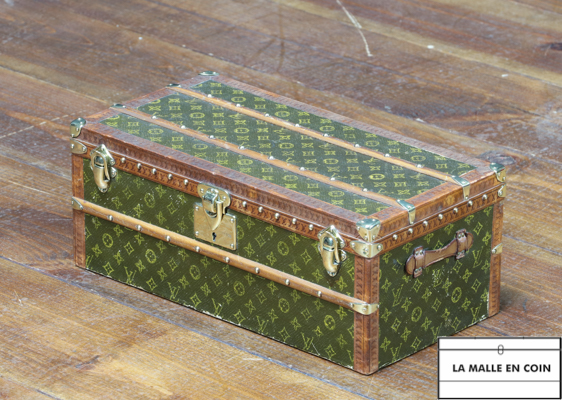 Lous Vuitton Flower Trunk
Lous Vuitton Flower Trunk
Desk Trunk
Louis Vuitton desk trunk
One of the rarest pieces of Louis Vuitton.
Here, the tray is not original. Absent, it has been restored.
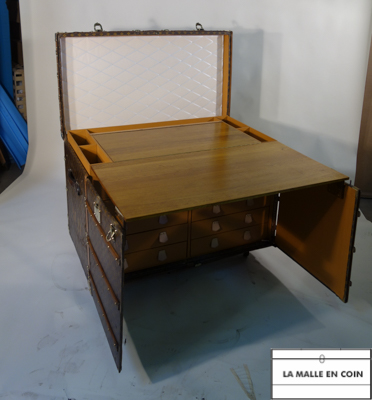
Trunk secretary
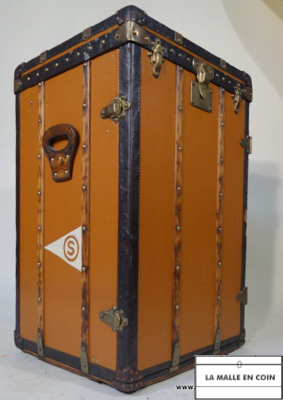
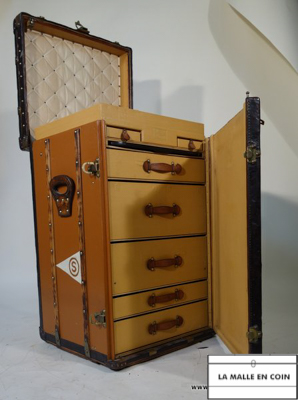
Louis Vuitton Alligator Suitcase
Special order in Alligator, having belonged to a diplomat of the embassy of Iran.
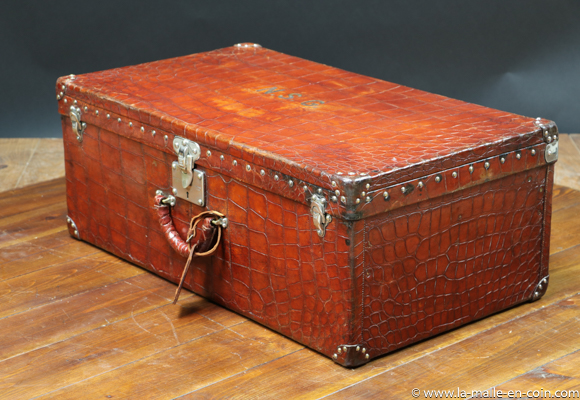
Leather steamer trunk of Grand Duke Cyrill of Russia
This trunk described in the book: "100 trunks of legend" was ordered, in 2 copies, by the great Duke Cyril Vladimirovich of Russia
It is now presented at the luggage museum
|
|
Book page 100 trunks of legend |
Zinc trunk Louis Vuitton
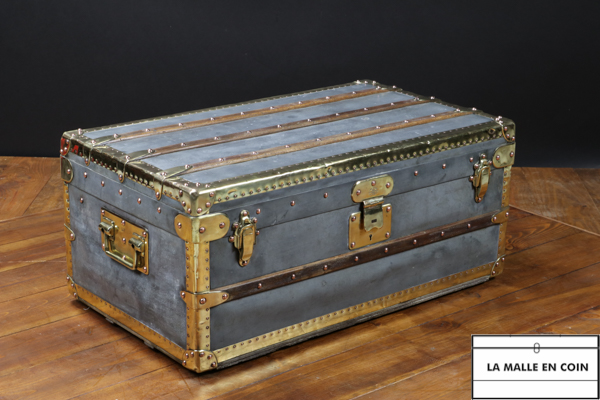 Zinc trunk Louis Vuitton Zinc trunk Louis Vuitton |
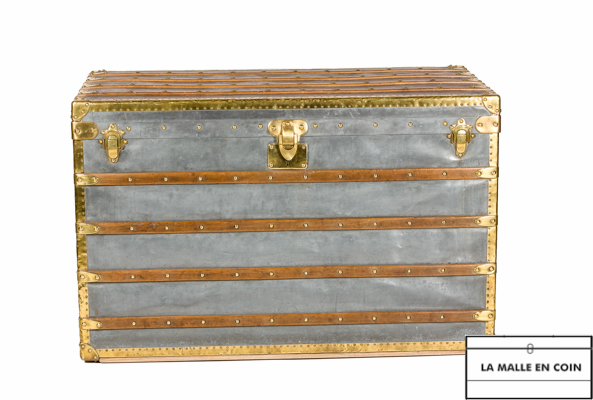 Zinc trunk Louis Vuitton Zinc trunk Louis Vuitton |
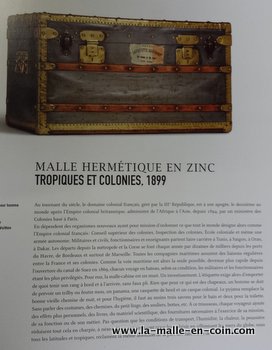 Book page "100 trunks of legend"
Book page "100 trunks of legend"
Louis Vuitton copper trunk
This trunk, very particular, was restored in our workshops and sold at the exhibition LEGENDARY TRUNK and is exhibited around the world
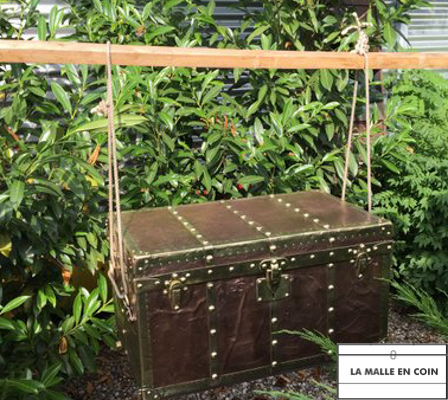 Exploration copper trunk Louis Vuitton |
|
Trunk for fishing rods (special order)
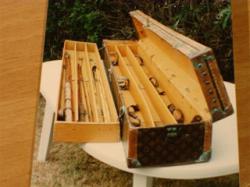
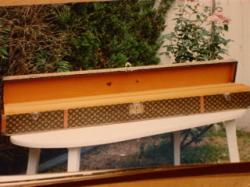
1914 Pharmacy Trunk
Louis Vuitton, a participant in the war effort, produces these little trunks without a cloth.
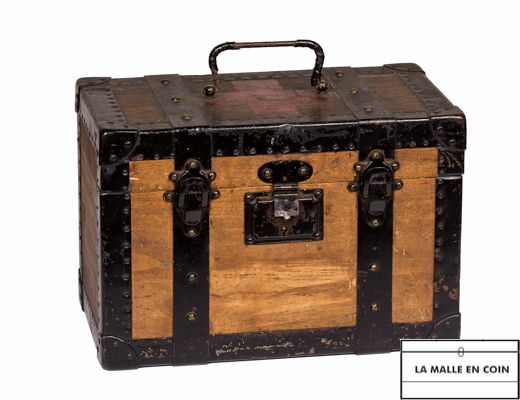 Pharmacy trunk Louis Vuitton 1914 Pharmacy trunk Louis Vuitton 1914 |
|
Louis Vuitton bed trunk
Louis Vuitton trunk in trianon gray canvas
We have restored 5 trunks in 20 years.
This is the oldest existing in the world, it is presented at the luggage museum
The others are exposed to the exhibition LEGENDARY TRUNK
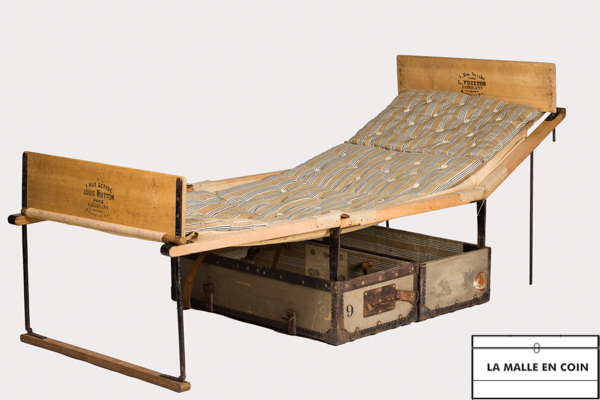
You have a model of that brand? We are willing to buy, contact us!
Vuitton stores
1854: 4 rue Neuve des Capucines
1859: workshops in Asnières
1871: installation at 1 rue Scribe
1885: London, Oxford Street 289
1889: Moving London shop to Strad Street 454
1900: Moving London shop to 149 New Bond Street
1909: Lille
1914: Champs-Elysées
1924: Cannes
1926: Vichy
1954: Avenue Marceau 78 bis
1978: Japan
Canvasses were first coated with bituminous substances and stretched over the trunk box, before being replaced by moleskin. The evolution of motifs and the canvas changes were systematically motivated, even in the beginnings, by protection concerns.
From the beginning, Vuitton suffered counterfeits.
Book: Traveling from the most remote times to the present day, by Gaston Vuitton, 1894
Dentu edition, Paris
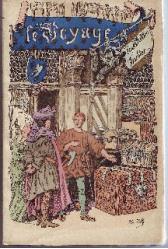
Vuitton : Chronologie en rouge :
Chronologie des malles
1821 Naissance de LVuiton à Anchay, son père est François Xavier Vuitton Meunier
1828 Guerlain première Boutique 1828 Etard créé le carton à chapeau en forme de champignon
1831 Naissance du chemin de fer
1837 Embauche de L Vuitton chez Maréchal coffretier emballeur
1838 Création d’une boutique de Sellier harnacheur Thierry Hermès.
1839 premier commis chez Maréchal 1845 Lavolaille invente la marmotte
1847 Louis François Cartier créé sa boutique
1848 rencontre de LV et François Goyard (20ans) qui travaille chez Morel installé 347 rue st honoré.
1849 1850 LV apprend à lire ! 1850 Le bazar du voyage (est la + célèbre maison de malles de l’époque )
1852 Boucicaut « invente » l’entrée libre dans un magasin sans obligation d’achat …
1852 créations de Goyard
1854 L’almanach Didot recense 100 sociétés de layettiers
1856 Creation de LV 1856 Première malle plate en gris trianon
1858 Première malle à casiers 1867 première récompense à l’exposition universelle
1868 première malle lit
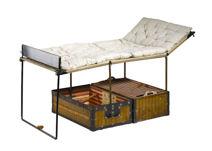
Ajout d'une video sur you tube d'une malle lit Louis Vuitton
Vous verrez le matin , il faut prendre du temps :-)
1868 malle en zinc étanche
1869 début des commandes spéciales de malles chez lv
1873 Georges Vuitton, 16 ans, rejoint l’atelier comme apprenti
1875 malle armoire (brevet à Vienne en 1852) son vrai succès démarre en 1890
1875 la concurrence (anglaise) met au point la sole leather (malle cuir et carton) et la « basket » malle
en osier ultra légère et le mix des deux : osier recouvert de cuir
1876 La malle rayée est à son tour copiée (Malle anonyme copie LV)
1876 création du nouveau motif rayure havane
1878 rencontre avec Savordan de Brazza, explorateur, qui commande une nouvelle malle lit 1879
G Vuitton se marie
1879 première malle de poupée à rayures marron, commande de Guerlain pour la St sylvestre .
1880 G Vuitton rachète à LV la société
1882 premières publicités dans les journaux 1883 Gaston louis Vuitton
1885 G Vuitton ouvre une boutique à Londres
1886 François Goyard cède son fonds de commerce à Edmond Goyard, son fils .
1886 premières serrures à ressort à gorges mobiles
1888 Premières malles à damier avec inscrit « Marques L.Vuitton déposée »
1889 Exposition universelle Présentation de malle à tiroirs, malle à fourrures avec intérieur
en camphrier (antimite) et étanche, malles robes, malles – chapeaux (cage à ruban fixe) Vuitton médaille d’or pour ses porte-habits
1889 naissance des jumeaux de Georges Pierre Eugène et Jean Armand (premier Vuitton à ne pas avoir Louis dans leurs prénoms )
1890 invention de la serrure numérotée supprimant les trousseaux de clés
1890 Innovation trunk compagnie (usa) relance la malle armoire
1890 le 9 octobre Clément Ader réalise le premier vol en Avion
1892 premier catalogue Vuitton (35 pages) 1892 décès de Louis Vuitton
1894 le livre de G Vuitton est achevé « le voyage depuis les temps reculés jusqu'à nos jours »
1896 création de La toile LV
1898 Malle Auto
1898 L’américain Wanamaket devient le représentant Vuitton aux USA
1901 Streamer Bag 1902 La Pégamoid ou Moleskine fait son apparition, elle est directement collée au fût
1904 Revendeur vente aux US chez Jordan Marsh and co 1904 Revendeur vente aux US
Marshall field and co et Roosbrother
1905 Malle secrétaire à tiroirs secrets de Brazza .
1906 Revendeur en Argentine James Smart 1907 Armand Dashbeck Bruxelles
1908 Malle aéro 1908 Magasin de Nice 1909 Magasin de Lille
1909 Chiffre d’affaires de Vuitton : 2 millions de F (contre 200.000 f en 1880)
1910 Revendeur P.M Lortet à Bankok 1911 Revendeur Les grands magasins chalons à Alexandrie
1911 Magasin à Trouville
1912 Revendeur CA benoît à Bombay.
1912 Vente aux US Beckers’s Leather Goods co et Becker et Wickser co .
1913 Adresse aux Champs Elysées
1924 Vuitton présente des objets et du mobilier à vocation sédentaire
1931 croisière jaune avec Malles Vuitton.
1935 ouverture d’un département jouet !
1936 Mort de Georges Vuitton, Gaston prend la suite, son Fils Henry 25 ans s’occupe du commercial.
1942 Henry Vuitton est décoré de la Francisque, ordre du maréchal Pétain.
1954 déménagement 78 av. Marceau 1954 Claude Vuitton, directeur d’usine
1959 Vuitton utilise le PVC, premier streamer bag en PVC 1959 Décès de J Vuitton, frère de Claude
1970 Gaston Louis Vuitton décède 1970 Chiffre d’affaires : 15 Millions €
1970 Henri Racamier prend les reines de l’entreprise (gendre de Vuitton)
1977 Rachat de Givenchy, Veuve Cliquot
1983 Création de la LV Cup de voile
1984 La malle aux souvenirs Henry Vuitton / Pierre Daliabart 1987 Fusion avec Moet et Chandon et création de LVMH
1989 Bernard Arnault prend le contrôle du groupe Sources : Louis Vuitton "Une saga francaise"
de Stephanie Bonvicini chez Fayard
Before 1900, the serial number should be between 1 and 99’999.
Vuitton: visit the family firm on the official website http://www.louisvuitton.com/
Louis Vuitton story in english
When Vuitton opened his first store in Paris in 1854, he began by selling flat-topped trunks that were lightweight
and airtight, and were bought by France's Empress Eugénie in its first year of sale. His first piece was the grey
Trianon canvas flat trunk. Vuitton was the first trunk-maker to create a flat-topped trunk or an airtight trunk.
(All trunks before this had rounded tops for water to run off, and thus could not be stacked.) Surprisingly,
the Monogram Canvas design was not created until after Louis Vuitton's death; it was created by his son, Georges.
1854 - Vuitton opened his first store in Paris on Rue Nueve des Capucines, founding
Louis Vuitton Malletier ("Louis Vuitton Trunk-Maker").
1860 - Vuitton opened a larger factory in Asnières-sur-Seine to accommodate increased demand.
1867 - Vuitton entered the Universal Exhibition at the World's Fair in Paris, winning the bronze medal.
1872 - Creation of the red and beige striped canvas
1876 - Creation of the wardrobe trunk, which contained a rail and small drawers for storing clothing.
1880 - Georges gets married and (on the same day) is given control of the business. 1
883 - Georges' son Gaston-Louis is born.
1885 - The first Louis Vuitton store in London opens. 1
888 - The Damier Canvas pattern is created by Louis Vuitton in collaboration with Georges,
and bears a logo that reads "marquee L. Vuitton déposée" (which literally means "mark
L. Vuitton deposited" or roughly "L. Vuitton trademark").
1889 - Vuitton wins the gold medal at the World's Fair in Paris.
1892 - Vuitton dies;the Vuitton company begins selling handbags. Age d'or de la Marque
Louis Vuitton (1893-1936) After Vuitton's death, Georges made Louis Vuitton a worldwide corporation.
1893 - Georges displays Vuitton products at the World's Fair in Chicago.
1894 - Georges publishes his book "Le Voyage".
1896 - Georges designs the 'Monogram Canvas' It came to be called 'Monogram Canvas;' its graphic
symbols were based on the trend for Japanese/Oriental designs in the late Victorian Period. This can
be considered the first "designer logo", since Georges was driven to create this pattern to prevent
further copying of Vuitton patterns (counterfeiting had already begun by this point). Georges then
sailed to the United States, in which he toured various cities such as New York, Philadelphia,
and Chicago. He sold Vuitton products during the visit.
1899 - Georges exhibited Vuitton products at the maiden Paris Auto Show. 1
900 - Georges Vuitton was given the honor to set up the "Travel Items and Leather Goods" section
of the 1900 Paris World Fair.
1901 - the Louis Vuitton Company introduced the 'Steamer Bag', a small handbag to be kept inside
Vuitton luggage trunks.
1904 - Georges chaired the jury for the St. Louis World Fair. In the same year, the Louis Vuitton
company introduced a new line of trunks that have special compartments for items s
uch as perfumes, clothing, and other goods.
1906 - Georges' son Gaston-Louis married Renee Versille and Louis Vuitton introduces trunks for automobiles.
1914 - The Louis Vuitton Building opens in Champs-Elysees. The building was the largest
travel-goods store in the world at that time. Store locations open in New York, Bombay,
Washington, London, Alexandria and Buenos Aires as World War I begins.
1924 - Only eight years after the end of World War I, the 'Keepall' is invented.
This bag foreran the duffel bag in a travel bag for light travel to keep necessities in.
1929 - The seventy-fifth anniversary of Louis Vuitton, a toiletry case is introduced specifically
for opera singer Marthe Chenal. It could fit bottles, brushes, mirrors, powder boxes and more toiletries.
1931 - Louis Vuitton introduced exotic bags such as a handbag of crocodile skin,
as well as elephant hide handbags for the Colonial Exhibition.
1932 - Louis Vuitton introduced the Nóe bag. This bag was made for champagne
vinter to transport bottles.
1933 - The Louis Vuitton Speedy bag was introduced.
1936 - The golden age of Louis Vuitton ends as Georges Vuitton passes away.
Estimates attribute Georges Vuitton with over 700 new Vuitton designs.
Gaston-Louis Vuitton assumes control of the company. The secretary trunk
is introduced for Leopold Stokowski, a conductor. Corporate Age of Louis Vuitton (1937 - Present Day)
François Goyard learns the trade of packer at Monsieur Morel, box and trunk-maker and packer (note: LV works at Maréchal), situated at Saint-Honoré street 233 in Paris.
To watch a video on Goyard shop Clic on the photo !
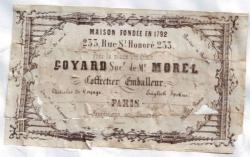
In 1853, François Goyard takes over from Morel who himself had succeeded to the famous Maison Martin, supplier of HRH the Duchess of Berry. Edmond, François’s son, will develop by the end of the 19th century an unalterable waterproof canvas to coat the trunks: the chevron canvas.
The Maison Goyard participates to several World Exhibitions in which it wins numerous awards: Paris, London, Brussels… In the beginning of the 20th century, Goyard joins forces with the great coach-builders, such as J. Rothschild and son, to design trunks that fit perfectly to cars.
The book about the Goyard history
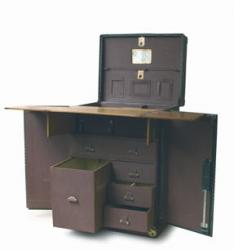
In 1936, Robert Goyard sets up the Comité Vendôme which includes the prestigious shops of Place Vendôme, but it is especially in 1931 that Robert develops the writing desk trunk that Conan Doyle will immediately order in a custom-made version. Now run by Jean-Michel Signoles, the chevron brand continues to expand and develops worldwide while perpetuating the Maison Goyard’s know-how: trunks for candles, for wines, for jewels, for perfumes, wardrobe trunks, trunk for a polo player’s equipment…
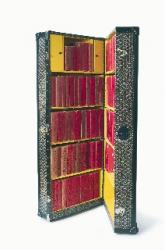
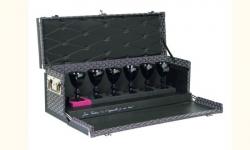
EXAMPLES OF GOYARD TRUNKS
Goyard trunks to be continued on next pages ? : find goyard trunks ?
Trunk that belonged to Her Highness
the Countess Suzanna Potocka (1899-1989)
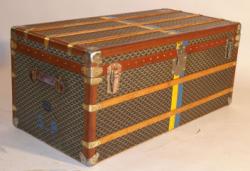
(A descendant of Aleksander Stanisław Potocki’s family) – She was able to flee from Poland and to take refuge in Switzerland during WWII. This good condition trunk epitomizes the baggage of the nobility families of that time. There are yellow and blue “stables” strips, the colors of the family coat of arms.
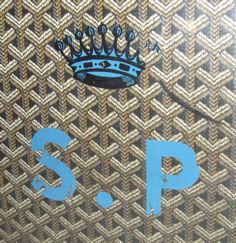
The SP monogram is preceded by the Countess nine-pointed crown.
You will notice that the stables strips on the below wardrobe trunk are the same ones.
We cannot be sure but it seems that the below trunk is of the same origin (we found these 2 trunks close to the Swiss border).
Liens: http://fr.wikipedia.org/wiki/Aleksander_Stanis%C5%82aw_Potocki http://fr.wikipedia.org/wiki/Stanis%C5%82aw_Kostka_Potocki http://genealog.home.pl/gd/szablony/osoba.php?lang=en&id=008919
Wardrobe trunk
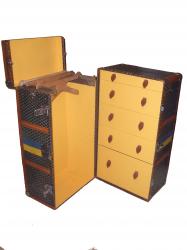
The wardrobe trunk is the best known among luxury trunks.
It can accompany a cruise passenger, enable to pack away a complete suit, and it is also the most convenient personal trunk.
Cabin trunk
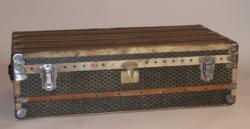 The trunk for travelers in liners
The trunk for travelers in liners
These trunks were placed under the cabin beds during the journey.
Hat trunks
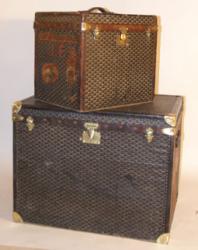
Top : Men hat trunk
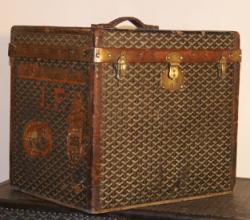
Shoes trunk
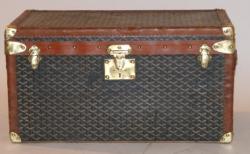 Less common, these trunks enable to pack side by side at least ten pairs of shoes, all of them wedged in trays coated with suede-like fabric.
Less common, these trunks enable to pack side by side at least ten pairs of shoes, all of them wedged in trays coated with suede-like fabric.
Following pages, for more Goyard trunks
Steamer trunk
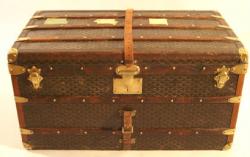
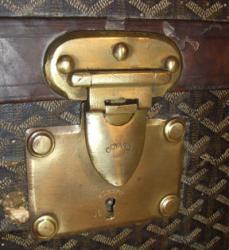
The steamer trunk is a great classic.
With standard dimensions 100x80x80, it is baggage’s basis.
“Disguised” cabin trunk
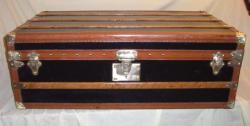 During WWII, many families, who were fleeing the occupying forces, had their luxury trunk painted in black (or they painted it themselves), in order to hide the signs of a not very discreet luxe in that particular time.
During WWII, many families, who were fleeing the occupying forces, had their luxury trunk painted in black (or they painted it themselves), in order to hide the signs of a not very discreet luxe in that particular time.
Thus, this Goyard trunk has its chevron canvas but it has been hided under a black paint layer. The lock alone enables the fine connoisseur to distinguish the high quality of that item.
Car external trunk
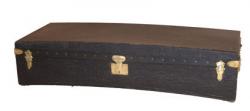 The below car external trunk was specially created and designed for a specific car model.
The below car external trunk was specially created and designed for a specific car model.
Chest – Trunk, the difference :
If we think, generally speaking, that the frontier between trunk and chest is very vague, we can nevertheless find some elements to help us to define what a trunk is.
Wooden pieces of furniture
First of all, a trunk is a piece of furniture which almost systematically has, in its original condition, an exterior coating (canvas, leather, imitation leather, pegamoid, or mere fabric), and an interior coating (paper, fabric, relon, leather…), unlike any kind of chest, with some exceptions of course. (to make things simpler!) Trunks are mainly made of common wood (poplar, fir, fruit tree…), preferably light, whereas chests are often made of fine wood such as walnut or oak and, depending on the regions, of fir (heavy wood).
Primary function of a trunk : travelling
The primary function of a trunk is to travel and, for that purpose, it must be light and strong. That is why trunk makers reinforce the box with hardware and slats. Thus a trunk that would fall from a loading dock is flexible and strong enough not to break, unlike a wooden chest whose framework, though very solid, will not resist a violent impact on an edge, for instance.
➡️ Click to learn more about the history of trunks and luggage.
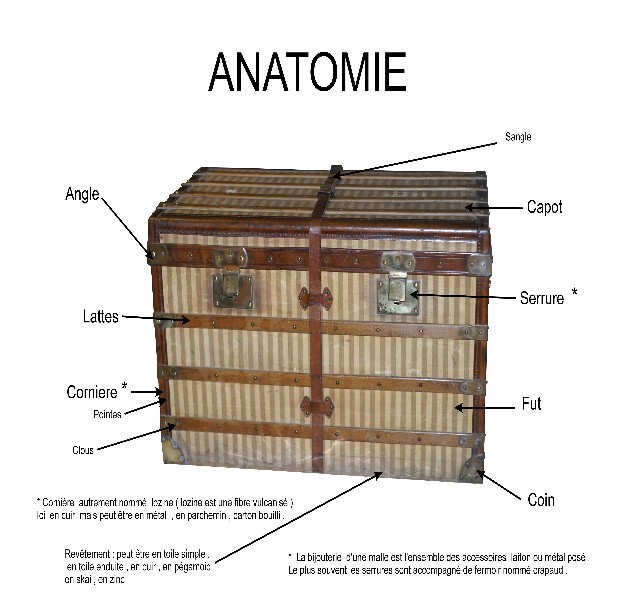
Dome top trunks
They find their origin in chests of yesteryear. They are domed in one way or in both ways, like a barrel.
A trunk needs to be protected by slats and equipped with angles and corners (metal, brass, leather, raw skin, even sometimes cardboard). Trunks can be found starting around 1800, but often they date back to the development of travels around 1850 and after.
Most of them are around 80 cm wide, 50 cm high and 50 cm deep. Dome top drunks are seldom more than a meter high.
➡️ You can find some dome top trunks on our website.
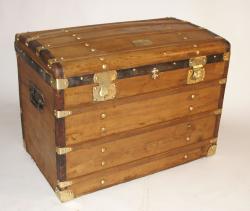 Curved trunk, brand : L'Hopital |
Curved trunk, stripped canvas |
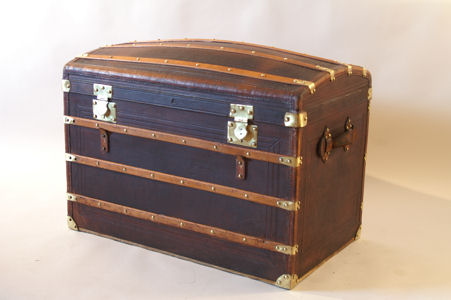
Curved trunk, leather wood and brass
|
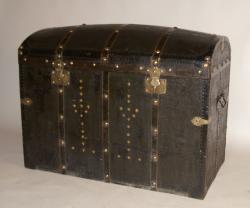
Curved trunk, canvas
|
|
This trunk has been restored and is now in the bathroom |
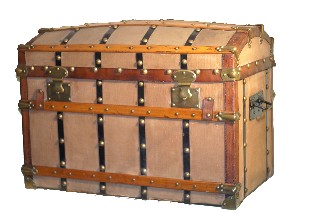
Alsacian trunk, brand Sturm in Strasbourg
|
Flat top trunks
Easier to pile up, flat top trunks are most often coated with oilcloth in their original condition.
➡️ Discover our article about Louis Vuitton Steamer trunks
➡️ Find some flat trunks on our website.
1912 Moynat trunk
This trunk (see the picture below) is typical of the flat top production from the 1900s on.
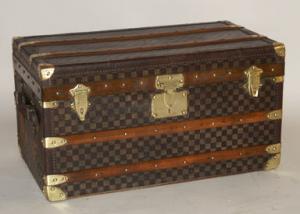
Steamer trunks
➡️Read our article on Vuitton Steamer trunks, and discover their distinctive features. Steamer trunks for men or ladies, canvases and finishing touches, arrangement advices...
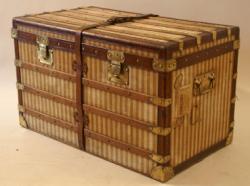
1890 Moynat trunk
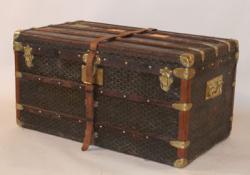
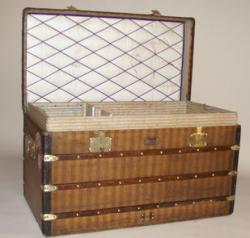 1889 Vuitton steamer trunk
1889 Vuitton steamer trunkHigh trunks
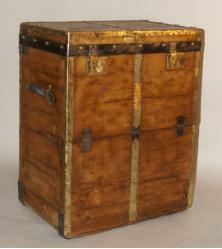 Moritz Maedler large steamer trunk
Moritz Maedler large steamer trunk
Cabin trunk
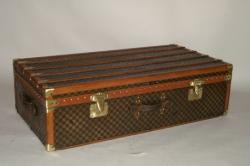 Moynat cabin trunk
Moynat cabin trunk
Other examples
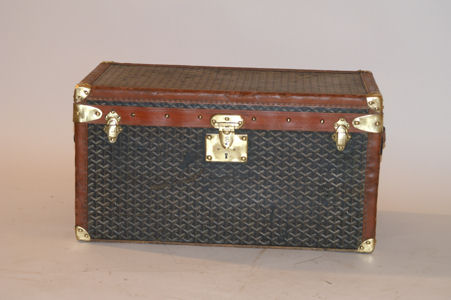
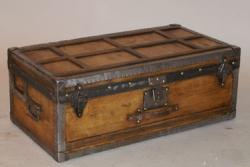
Bentwood banded trunks
Bentwood banded trunks find their origin in Eastern Europe. They are common in eastern France, Germany, Austria… As for Thonet and his café chairs, the wooden slats have been bent with a steam bending process. The bentwood banded trunk represents the ideal trunk. It is light due to its laminated poplar structure and at the same time flexible and very strong. There are bentwood banded trunks of all shapes. They are safe for children because of their very very light lid.
➡️Find some curved trunks on our website.
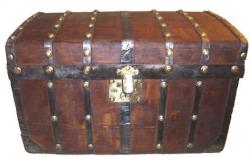
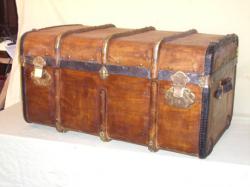
Steamer bentwood banded trunk
|
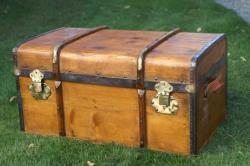 |
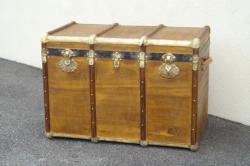
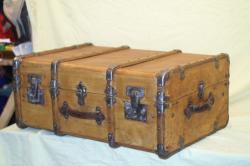
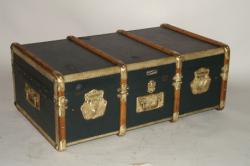 Lavolaille branded bentwood banded trunk
Lavolaille branded bentwood banded trunk
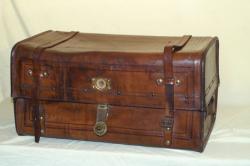
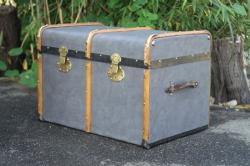 Leather-coated bentwood banded trunk
Leather-coated bentwood banded trunk
Doll trunks
There are different types of doll trunks : the small doll trunks, made to play with a trunk scaled to the doll's size, and larger doll trunks, meant for the doll to be inside the trunk. Some of them look like works of art due to their high quality.
➡️ Find beautiful decorative doll trunks on our website La malle en coin.
Discover the story of doll trunks on video
In five minutes, discover all the diversity and charm of doll trunks. Their story and their style, logically, has always followed the evolutions of full sized trunks. You can find tiny flat trunks, small curved trunks, doll wardrobes...
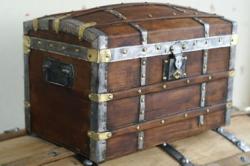
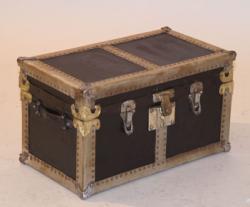 |
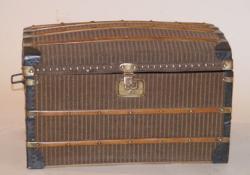 |
| Doll trunk from the USA | Doll trunk with its original canvas |
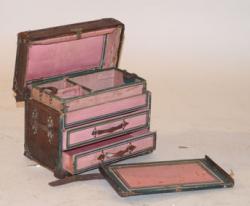 |
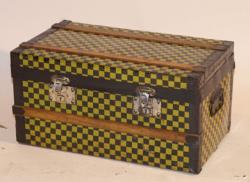 |
| Leather and brass doll trunk, With flat top and commode (19th century) |
Flat-top doll trunk coated with painted sheet metal |
Hat trunks
As a 19th century essential accessory, doll trunks exist in various forms.
- You can find trunks meant for a single hat, for top hats, perfectly protected by a reversed shape that matches the shape of the hat.
- Hat trunks dedicated to women's wardrobes also exist, either with trays made of crisscross securing straps, or equipped with sorts of half-spheres enabling to hang hats on each side of the trunk.
➡️Discover our article about hat trunks, our find out about them in the video below. Jean-Philippe tells you all about these very special items, based on the history of Vuitton's hat trunks.
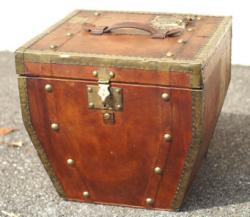
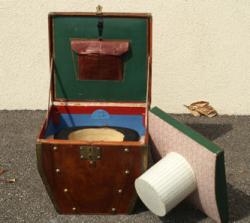
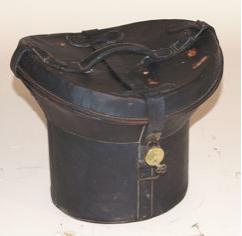
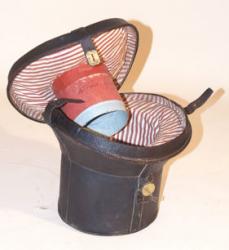
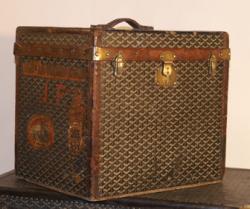
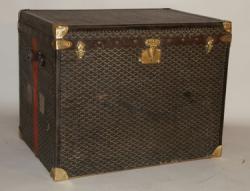
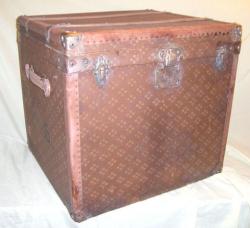 Goyard women’s hat trunk
Goyard women’s hat trunkBrand: "Aux Etats-Unis"
Wardrobe trunks
The wardrobe trunk (often mistakenly called "cabin trunk") was invented in the 1875's, but it is in 1890 that it is really marketed. It can be found with very different layouts. The most conventional one is a configuration with a bentwood banded part and another part with drawers, but some of them have a drop-leaf desk, some of them are laid out as wardrobe only, some others as drawers only.
The most diverse accessories can be added to the trunks. Some of them contain for instance an iron, an ironing board, a shoe box... Trunk makers have a limitless imagination. Thus you can find bookcase wardrobe trunks, desk wardrobe trunks, wardrobe trunks with space for storing kitchen accessories (Goyard)…
➡️Find the wardrobe trunks on La malle en coin.
➡️You can also discover our article on Louis Vuitton's wardrobes, presenting all the different models, from the most common to the most original ones, starting with the first pattent (dating from arond 1852) of the brand.
Wardrobe trunks on video
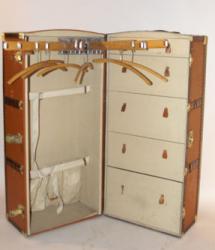
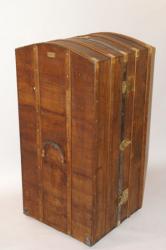
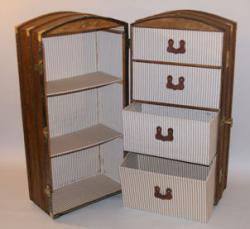
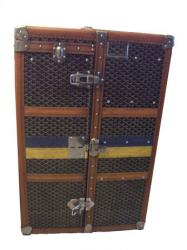 Goyard wardrobe trunk
Goyard wardrobe trunk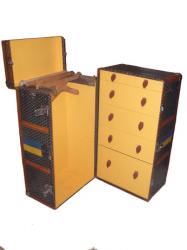
Commod trunks
➡️You can find a selection of commod trunks on La malle en coin, and also see a few pictures below.
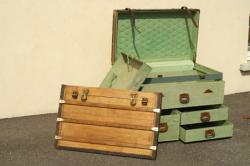
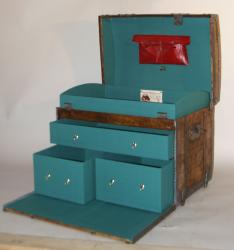
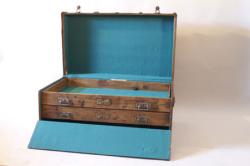
Car external trunks
Car external trunks are inextricably linked to the automobile sector development. The vehicles were taken on one hand to a coach-builder, and on the other hand to a trunk-maker who custom-built the requested trunk (ersatz of our current car trunk). Therefore, when the automobile industry was beginning to thrive, you could find just as much models of external trunks as car body types. Later on, trunks change place on cars, they are placed inside the car built-in trunk, or on the roof, on the wings, or on the rear hood. They could have very original shapes, according to the needs.
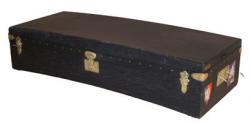
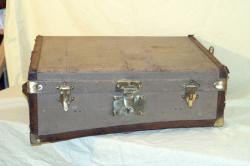
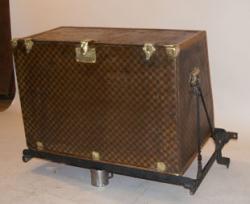
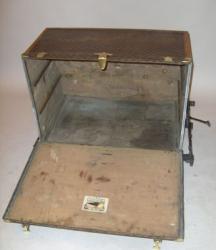
Wicker trunks
Wicker trunks alone could be the subject of a study… However, wicker is a peculiar living material that requires some knowledge in wickerwork to be restored. Light, inexpensive, it nevertheless has the disadvantage of not being waterproof…
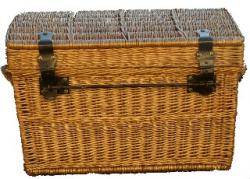
Leather trunks
➡️ You can find leather trunks on our website.
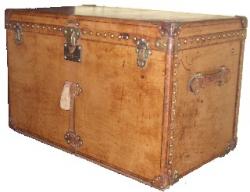
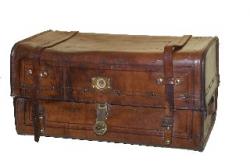
Brand "Alexis Godillot"
Metal trunks
See the pictures below.
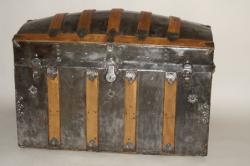 Curved trunk from 1875
Curved trunk from 1875 with zinc (USA)
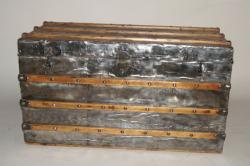
(country cooler)
American trunks
The trunks of American origin meet the same travel needs as the other ones, thus they obviously do not have a peculiar shape but their jewelry, however, is characteristic. The jewelry is somehow over-ornate, often "carved", and the thicker section wood is not made of poplar.
The locks also are different, more seldom brass ones. The corners, particularly reinforced, are often dated and sometimes even wear initials.
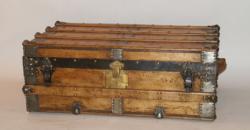
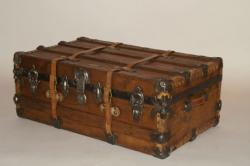
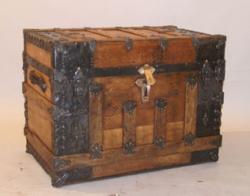
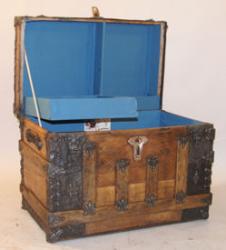

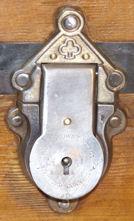
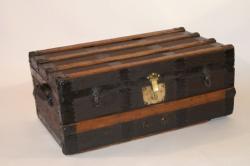
Special trunks
The creativity of trunkmakers is limitless, therefore we often encounter very surprising trunks, such as the bed trunk, the desk trunk, or even trunks made to measure for famous people, such as the Stokowski trunk or the Lily Pons trunk...
➡️ Read our article about the Lily Pons trunk, made to measure for the great lyrical singer.
➡️Find a selection of surprising trunks, with diverse shapes and features.
➡️...and also unusual trunks available for restoration.
The Stokowski trunk, by Louis Vuitton
The library trunk, Louis Vuitton
The writing desk trunk, Louis Vuitton
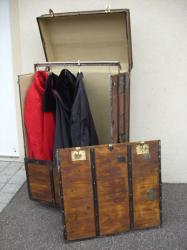

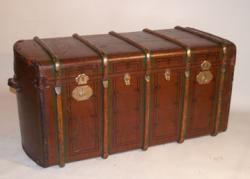
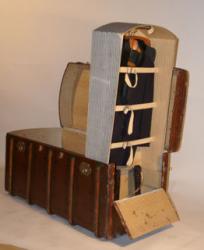
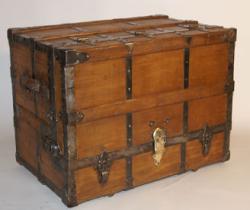
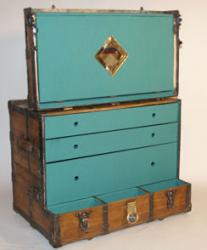
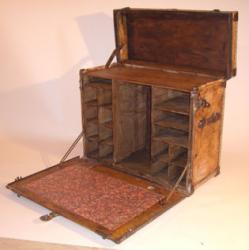
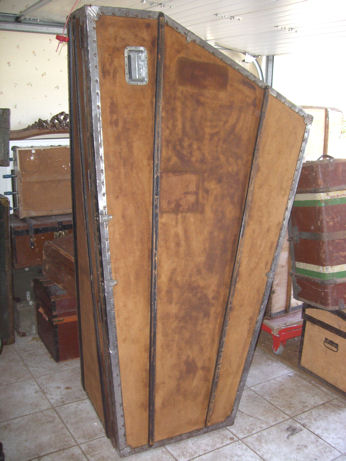
Chest – Trunk, the difference :
If we think, generally speaking that the frontier between trunk and chest is very vague, we can nevertheless find some elements to help us to define what a trunk is. First of all, a trunk is a piece of furniture which almost systematically has, in its original condition, an exterior coating (canvas, leather, imitation leather, pegamoid, or mere fabric), and an interior coating (paper, fabric, relon, leather…), unlike any kind of chest, with some exceptions of course to make things simpler! Trunks are mainly made of common wood (poplar, fir, fruit tree…), preferably light, whereas chests are often made of fine wood such as walnut or oak and, depending on the regions, of fir (heavy wood). The primary function of a trunk is to travel and, for that purpose, it must be light and strong. That is why trunk makers reinforce the box with hardware and slats. Thus a trunk that would fall from a loading dock is flexible and strong enough not to break, unlike a wooden chest whose framework, though very solid, will not resist a violent impact on an edge for instance.
Available video of the museum

Dome top trunks
They find their origin in chests of yesteryear.
They are domed in one way or in both ways like a barrel.
A trunk needs to be protected by slats and equipped with angles and corners (metal, brass, leather, raw skin, even sometimes cardboard). Trunks can be found from around 1800, but most often they date back to the development of travels around 1850 and after.
Most of them are around 80 cm wide, 50 cm high and 50 cm deep.
Dome top drunks are seldom more than a meter high.
 Curved trunk, brand : L'Hopital |
Curved trunk, stripped canvas |

Curved trunk, leather wood and brass
|

Curved trunk, canvas
|
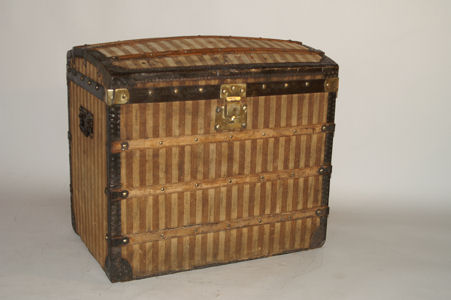 Malle bombée toile rayée, aux env. de 1880 (anonyme) Cette malle a été restaurée et a rejoint le cabinet de toilette de Nap 3 au sein du musée du château de Fontainebleau. |

Malle Alsacienne de marque Sturmà Strasbourg
|
Les malles plates

Malle Moynat de 1912 .
Cette pièce est typique de la production de malles plates à partir des années 1900.
Plus facile à empiler, les malles plates sont le plus souvent recouvertes d’origine d’une toile enduite.
Malle courrier



Malle haute

Malle Cabine

Autres exemples


Les malles cintrées

Les malles cintrées ont leurs origines dans l’est de l’europe. Elles sont courantes dans l’est de la France, en Allemagne, en Autriche ... A la façon de Thonet pour ses sièges de bistrot, on a mis au point le cintrage à l’étuve des lattes de malles Les malles cintrées représentent l’idéal de la malle. Elles sont légères par leur construction en placage lamellé de peuplier et à la fois souples et très résistantes. Il existe des malles cintrées de toutes les formes. Elles sont sécurisantes pour les enfants, car leur capot est très très léger.

Malle cintrée courrier
|
 |





Les malles de poupée
On distingue les petites malles de poupée, pour jouer à la poupée et les malles de poupée un peu plus grandes, pour ranger sa poupée. Certaines pièces ressemblent, par leur qualité, à des ouvrages de maîtrise.

 |
 |
| Malle de poupée USA | Malle de poupée avec sa toile d'origine |
 |
 |
| Malle de poupée en cuir et laiton, plate et commode (19ème) |
Malle de poupée plate recouverte de tole peinte |
Les malles à chapeau
Accessoire essentiel au 19ème, la malle à chapeau existe sous différentes formes.
On en trouve à 1 chapeau, qui contient un chapeau-claque homme, parfaitement protégé par une forme inverse à celle du chapeau épousant ses formes.
On en trouve pour femme, soit avec des casiers en lanières, soit équipes de champignons,
sortes de demi-sphères permettant de fixer les chapeaux sur chaque face de la malle.







*
Les malles Armoire ou Wardrobe
La malle armoire ou Wardrobe (souvent appelée malle cabine) a été inventée dans les années 1875, mais c’est en 1890 qu’elle se commerciale réellement. On en trouve avec des configurations très diverses.
La plus traditionnelle est une disposition avec une partie cintrée et une partie tiroirs, mais certaines disposent d’un abattant formant secrétaire, certaines sont uniquement configurées en penderie ou uniquement en tiroirs.
Les accessoires les plus divers peuvent compléter les malles. Sur certaines, on trouve un fer à repasser, une table à repasser, une valise à chaussures. L’imagination des malletiers est sans limite. Ainsi, on a vu des malles armoire bibliothèque, des malles armoire bureau, des malles armoire pour ranger les accessoires de cuisine (Goyard)
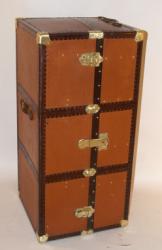





Les malles commodes



Les malles Automobile
Les malles automobile sont intimement liées à l’évolution de l’automobile. Les véhicules étaient confiés d’une part à un carrossier et d’autre part à un malletier, qui réalisait sur mesure la malle désirée (Ersatz de notre coffre actuel). On trouve donc, pour cette époque du début de l’automobile, autant de modèles de malles que de types de carrosseries. Plus tard, la malle a changé de place sur l’automobile, elle fût placée à l’intérieur du coffre, sur le toit, sur les ailes, sur le capot arrière et prit des formes très originales selon les besoins.




Les malles Osiers
Les malles en osier pourraient faire l’objet d’une étude à elles seules... Cependant, l’osier est une matière vivante, particulière qui nécessite des connaissances en vannerie pour être restaurée. Légère, peu coûteuse, elle a néanmoins comme inconvénient de ne pas être étanche..

Les malles cuir


Les malles métalliques


Les malles américaines
Les malles d’origine américaine répondent aux mêmes besoins de voyage que les autres, aussi ces malles ne sont évidemment pas d'une forme propre mais leur bijouterie est, par contre, caractéristique.
La bijouterie est plus chargée, souvent "sculptée", le bois n'est pas en peuplier et de section plus épaisse.
Les serrures sont différentes, plus rarement en laiton.
Les coins, particulierement renforcés, sont souvent datés, voire dans certains cas, siglés.







Les malles spéciales








Chest – Trunk, the difference :
If we think, generally speaking that the frontier between trunk and chest is very vague, we can nevertheless find some elements to help us to define what a trunk is. First of all, a trunk is a piece of furniture which almost systematically has, in its original condition, an exterior coating (canvas, leather, imitation leather, pegamoid, or mere fabric), and an interior coating (paper, fabric, relon, leather…), unlike any kind of chest, with some exceptions of course to make things simpler! Trunks are mainly made of common wood (poplar, fir, fruit tree…), preferably light, whereas chests are often made of fine wood such as walnut or oak and, depending on the regions, of fir (heavy wood). The primary function of a trunk is to travel and, for that purpose, it must be light and strong. That is why trunk makers reinforce the box with hardware and slats. Thus a trunk that would fall from a loading dock is flexible and strong enough not to break, unlike a wooden chest whose framework, though very solid, will not resist a violent impact on an edge for instance.
Available video of the museum

Dome top trunks
They find their origin in chests of yesteryear.
They are domed in one way or in both ways like a barrel.
A trunk needs to be protected by slats and equipped with angles and corners (metal, brass, leather, raw skin, even sometimes cardboard). Trunks can be found from around 1800, but most often they date back to the development of travels around 1850 and after.
Most of them are around 80 cm wide, 50 cm high and 50 cm deep.
Dome top drunks are seldom more than a meter high.
 Curved trunk, brand : L'Hopital |
Curved trunk, stripped canvas |

Curved trunk, leather wood and brass
|

Curved trunk, canvas
|
 Malle bombée toile rayée, aux env. de 1880 (anonyme) Cette malle a été restaurée et a rejoint le cabinet de toilette de Nap 3 au sein du musée du château de Fontainebleau. |

Malle Alsacienne de marque Sturmà Strasbourg
|
Les malles plates

Malle Moynat de 1912 .
Cette pièce est typique de la production de malles plates à partir des années 1900.
Plus facile à empiler, les malles plates sont le plus souvent recouvertes d’origine d’une toile enduite.
Malle courrier



Malle haute

Malle Cabine

Autres exemples


Les malles cintrées

Les malles cintrées ont leurs origines dans l’est de l’europe. Elles sont courantes dans l’est de la France, en Allemagne, en Autriche ... A la façon de Thonet pour ses sièges de bistrot, on a mis au point le cintrage à l’étuve des lattes de malles Les malles cintrées représentent l’idéal de la malle. Elles sont légères par leur construction en placage lamellé de peuplier et à la fois souples et très résistantes. Il existe des malles cintrées de toutes les formes. Elles sont sécurisantes pour les enfants, car leur capot est très très léger.

Malle cintrée courrier
|
 |





Les malles de poupée
On distingue les petites malles de poupée, pour jouer à la poupée et les malles de poupée un peu plus grandes, pour ranger sa poupée. Certaines pièces ressemblent, par leur qualité, à des ouvrages de maîtrise.

 |
 |
| Malle de poupée USA | Malle de poupée avec sa toile d'origine |
 |
 |
| Malle de poupée en cuir et laiton, plate et commode (19ème) |
Malle de poupée plate recouverte de tole peinte |
Les malles à chapeau
Accessoire essentiel au 19ème, la malle à chapeau existe sous différentes formes.
On en trouve à 1 chapeau, qui contient un chapeau-claque homme, parfaitement protégé par une forme inverse à celle du chapeau épousant ses formes.
On en trouve pour femme, soit avec des casiers en lanières, soit équipes de champignons,
sortes de demi-sphères permettant de fixer les chapeaux sur chaque face de la malle.







*
Les malles Armoire ou Wardrobe
La malle armoire ou Wardrobe (souvent appelée malle cabine) a été inventée dans les années 1875, mais c’est en 1890 qu’elle se commerciale réellement. On en trouve avec des configurations très diverses.
La plus traditionnelle est une disposition avec une partie cintrée et une partie tiroirs, mais certaines disposent d’un abattant formant secrétaire, certaines sont uniquement configurées en penderie ou uniquement en tiroirs.
Les accessoires les plus divers peuvent compléter les malles. Sur certaines, on trouve un fer à repasser, une table à repasser, une valise à chaussures. L’imagination des malletiers est sans limite. Ainsi, on a vu des malles armoire bibliothèque, des malles armoire bureau, des malles armoire pour ranger les accessoires de cuisine (Goyard)






Les malles commodes



Les malles Automobile
Les malles automobile sont intimement liées à l’évolution de l’automobile. Les véhicules étaient confiés d’une part à un carrossier et d’autre part à un malletier, qui réalisait sur mesure la malle désirée (Ersatz de notre coffre actuel). On trouve donc, pour cette époque du début de l’automobile, autant de modèles de malles que de types de carrosseries. Plus tard, la malle a changé de place sur l’automobile, elle fût placée à l’intérieur du coffre, sur le toit, sur les ailes, sur le capot arrière et prit des formes très originales selon les besoins.




Les malles Osiers
Les malles en osier pourraient faire l’objet d’une étude à elles seules... Cependant, l’osier est une matière vivante, particulière qui nécessite des connaissances en vannerie pour être restaurée. Légère, peu coûteuse, elle a néanmoins comme inconvénient de ne pas être étanche..

Les malles cuir


Les malles métalliques


Les malles américaines
Les malles d’origine américaine répondent aux mêmes besoins de voyage que les autres, aussi ces malles ne sont évidemment pas d'une forme propre mais leur bijouterie est, par contre, caractéristique.
La bijouterie est plus chargée, souvent "sculptée", le bois n'est pas en peuplier et de section plus épaisse.
Les serrures sont différentes, plus rarement en laiton.
Les coins, particulierement renforcés, sont souvent datés, voire dans certains cas, siglés.







Les malles spéciales








Chest – Trunk, the difference :
If we think, generally speaking that the frontier between trunk and chest is very vague, we can nevertheless find some elements to help us to define what a trunk is. First of all, a trunk is a piece of furniture which almost systematically has, in its original condition, an exterior coating (canvas, leather, imitation leather, pegamoid, or mere fabric), and an interior coating (paper, fabric, relon, leather…), unlike any kind of chest, with some exceptions of course to make things simpler! Trunks are mainly made of common wood (poplar, fir, fruit tree…), preferably light, whereas chests are often made of fine wood such as walnut or oak and, depending on the regions, of fir (heavy wood). The primary function of a trunk is to travel and, for that purpose, it must be light and strong. That is why trunk makers reinforce the box with hardware and slats. Thus a trunk that would fall from a loading dock is flexible and strong enough not to break, unlike a wooden chest whose framework, though very solid, will not resist a violent impact on an edge for instance.
Available video of the museum

Dome top trunks
They find their origin in chests of yesteryear.
They are domed in one way or in both ways like a barrel.
A trunk needs to be protected by slats and equipped with angles and corners (metal, brass, leather, raw skin, even sometimes cardboard). Trunks can be found from around 1800, but most often they date back to the development of travels around 1850 and after.
Most of them are around 80 cm wide, 50 cm high and 50 cm deep.
Dome top drunks are seldom more than a meter high.
 Curved trunk, brand : L'Hopital |
Curved trunk, stripped canvas |

Curved trunk, leather wood and brass
|

Curved trunk, canvas
|
 Malle bombée toile rayée, aux env. de 1880 (anonyme) Cette malle a été restaurée et a rejoint le cabinet de toilette de Nap 3 au sein du musée du château de Fontainebleau. |

Malle Alsacienne de marque Sturmà Strasbourg
|
Les malles plates

Malle Moynat de 1912 .
Cette pièce est typique de la production de malles plates à partir des années 1900.
Plus facile à empiler, les malles plates sont le plus souvent recouvertes d’origine d’une toile enduite.
Malle courrier



Malle haute

Malle Cabine

Autres exemples


Les malles cintrées

Les malles cintrées ont leurs origines dans l’est de l’europe. Elles sont courantes dans l’est de la France, en Allemagne, en Autriche ... A la façon de Thonet pour ses sièges de bistrot, on a mis au point le cintrage à l’étuve des lattes de malles Les malles cintrées représentent l’idéal de la malle. Elles sont légères par leur construction en placage lamellé de peuplier et à la fois souples et très résistantes. Il existe des malles cintrées de toutes les formes. Elles sont sécurisantes pour les enfants, car leur capot est très très léger.

Malle cintrée courrier
|
 |





Les malles de poupée
On distingue les petites malles de poupée, pour jouer à la poupée et les malles de poupée un peu plus grandes, pour ranger sa poupée. Certaines pièces ressemblent, par leur qualité, à des ouvrages de maîtrise.

 |
 |
| Malle de poupée USA | Malle de poupée avec sa toile d'origine |
 |
 |
| Malle de poupée en cuir et laiton, plate et commode (19ème) |
Malle de poupée plate recouverte de tole peinte |
Les malles à chapeau
Accessoire essentiel au 19ème, la malle à chapeau existe sous différentes formes.
On en trouve à 1 chapeau, qui contient un chapeau-claque homme, parfaitement protégé par une forme inverse à celle du chapeau épousant ses formes.
On en trouve pour femme, soit avec des casiers en lanières, soit équipes de champignons,
sortes de demi-sphères permettant de fixer les chapeaux sur chaque face de la malle.







*
Les malles Armoire ou Wardrobe
La malle armoire ou Wardrobe (souvent appelée malle cabine) a été inventée dans les années 1875, mais c’est en 1890 qu’elle se commerciale réellement. On en trouve avec des configurations très diverses.
La plus traditionnelle est une disposition avec une partie cintrée et une partie tiroirs, mais certaines disposent d’un abattant formant secrétaire, certaines sont uniquement configurées en penderie ou uniquement en tiroirs.
Les accessoires les plus divers peuvent compléter les malles. Sur certaines, on trouve un fer à repasser, une table à repasser, une valise à chaussures. L’imagination des malletiers est sans limite. Ainsi, on a vu des malles armoire bibliothèque, des malles armoire bureau, des malles armoire pour ranger les accessoires de cuisine (Goyard)






Les malles commodes



Les malles Automobile
Les malles automobile sont intimement liées à l’évolution de l’automobile. Les véhicules étaient confiés d’une part à un carrossier et d’autre part à un malletier, qui réalisait sur mesure la malle désirée (Ersatz de notre coffre actuel). On trouve donc, pour cette époque du début de l’automobile, autant de modèles de malles que de types de carrosseries. Plus tard, la malle a changé de place sur l’automobile, elle fût placée à l’intérieur du coffre, sur le toit, sur les ailes, sur le capot arrière et prit des formes très originales selon les besoins.




Les malles Osiers
Les malles en osier pourraient faire l’objet d’une étude à elles seules... Cependant, l’osier est une matière vivante, particulière qui nécessite des connaissances en vannerie pour être restaurée. Légère, peu coûteuse, elle a néanmoins comme inconvénient de ne pas être étanche..

Les malles cuir


Les malles métalliques


Les malles américaines
Les malles d’origine américaine répondent aux mêmes besoins de voyage que les autres, aussi ces malles ne sont évidemment pas d'une forme propre mais leur bijouterie est, par contre, caractéristique.
La bijouterie est plus chargée, souvent "sculptée", le bois n'est pas en peuplier et de section plus épaisse.
Les serrures sont différentes, plus rarement en laiton.
Les coins, particulierement renforcés, sont souvent datés, voire dans certains cas, siglés.







Les malles spéciales








Contact
Email
info@la-malle-en-coin.com
Phone
+33 (0)3 88 93 28 23


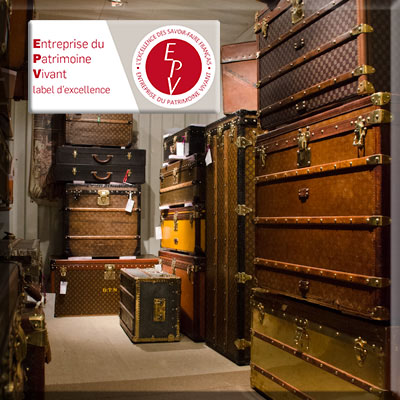
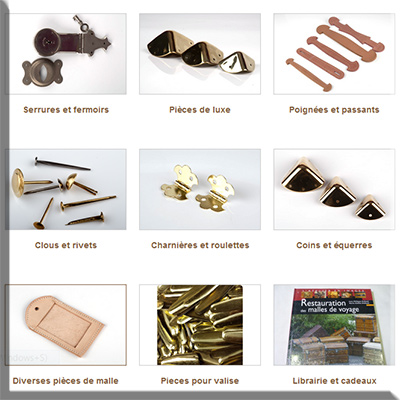
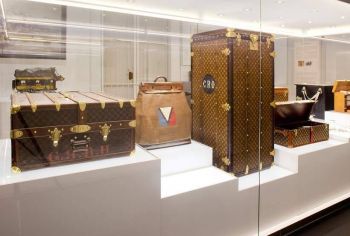
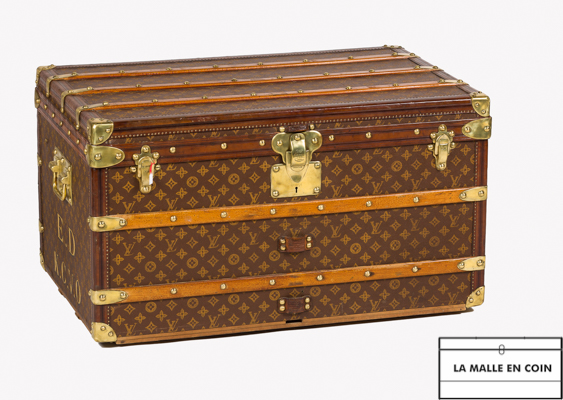
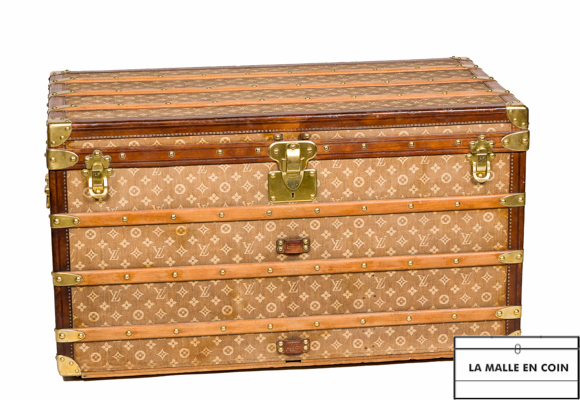
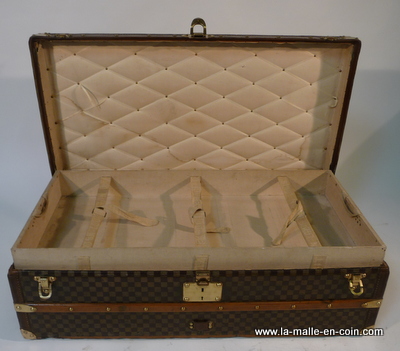 Louis Vuitton Damier cabin trunk
Louis Vuitton Damier cabin trunk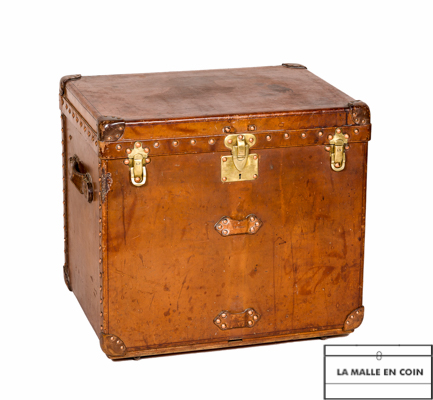
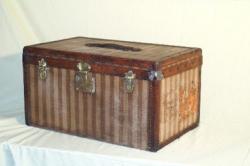
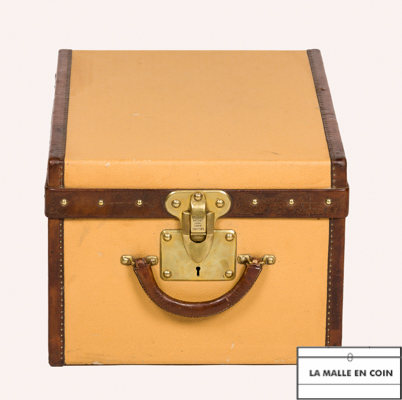
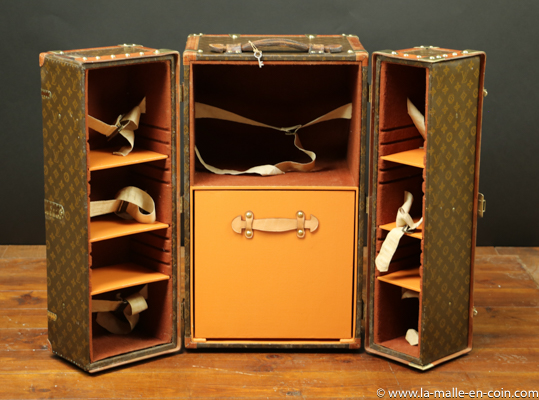 Open monogrammed library trunk
Open monogrammed library trunk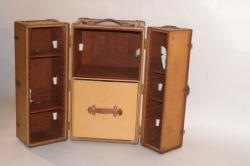 Trunk bookcase leather special order
Trunk bookcase leather special order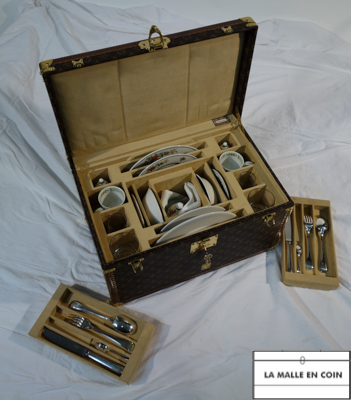
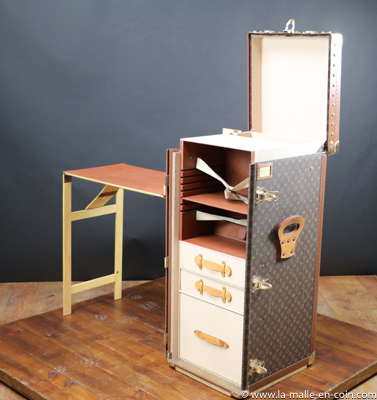
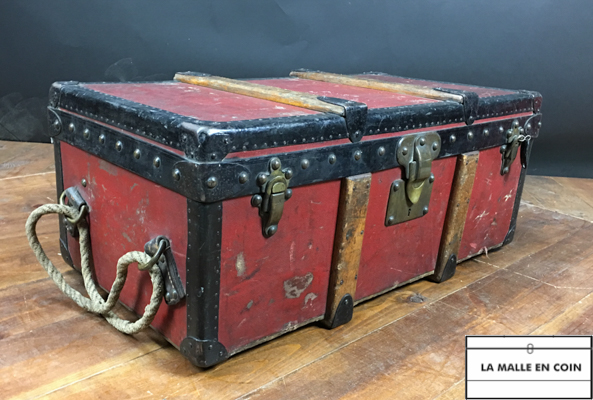
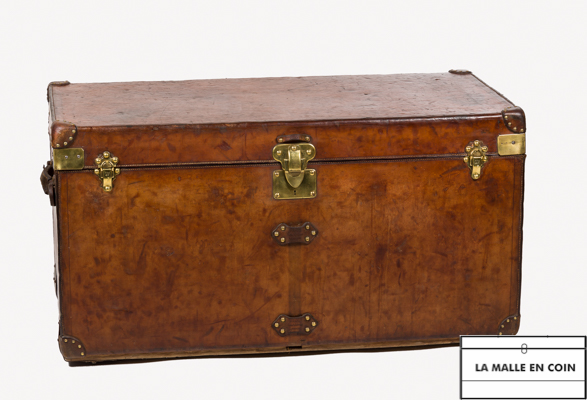
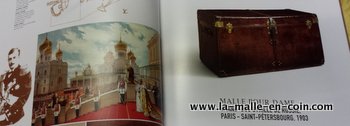
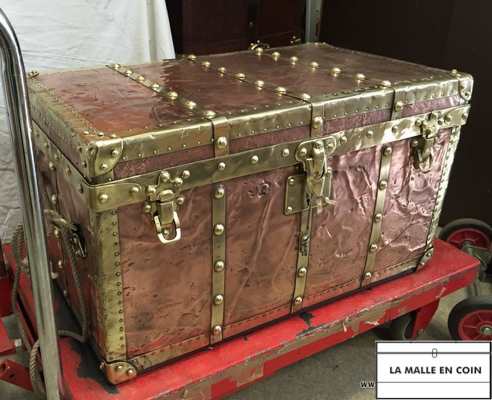
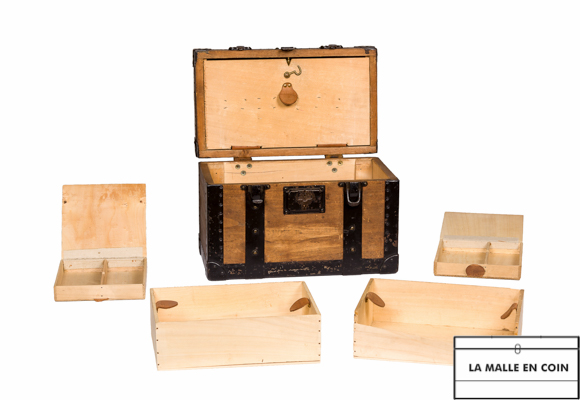 Pharmacy trunk Louis Vuitton 1914
Pharmacy trunk Louis Vuitton 1914